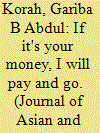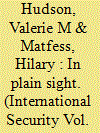| Srl | Item |
| 1 |
ID:
132313


|
|
|
|
|
| Publication |
2014.
|
| Summary/Abstract |
Like many ethnic groups in sub-Saharan Africa, the Dagaaba of northwest (now Upper West region) Ghana have regarded, and for the most part, continue to regard the payment of the brideprice as the cornerstone upon which marriage is built - without it a marriage contract is not considered legal. Since the 1980s, however, the significance or essence of the payment has been contested and challenged by many Dagaaba. While some (young men) argue for a reform of the payment, others (young women) argue that the practice should be abolished altogether. Yet a third group (mostly elders) believes that brideprice payment is a "tradition" passed down over generations that should be maintained. This article examines the origins and historical significance of brideprice payments, and how views about these payments have changed over time among the Dagaaba - from those born near the close of the last century, to those of marriageable age now. The goal of this examination is to contribute to the ongoing discussion among African scholars and governments on the importance of maintaining certain aspects of their cultural heritage.
|
|
|
|
|
|
|
|
|
|
|
|
|
|
|
|
| 2 |
ID:
153630


|
|
|
|
|
| Summary/Abstract |
Approximately seventy-five percent of the world's population lives in countries where asset exchange upon marriage is obligatory. Rising brideprice—money or gifts provided to a woman's family by the groom and his family as part of marriage arrangements—is a common if overlooked catalyst of violent conflict. In patrilineal (and some matrilineal) societies where brideprice is practiced, a man's social status is directly connected to his marital status. Brideprice acts as a flat tax that is prone to sudden and swift increases. As a result, rising brideprice can create serious marriage market distortions that prevent young men, especially those who are poor or otherwise marginalized, from marrying. This phenomenon is especially evident in polygamous societies, where wealthy men can afford more than one bride. These distortions incentivize extra-legal asset accumulation, whether through ad hoc raiding or organized violence. In such situations, rebel and terror groups may offer to pay brideprice—or even provide brides—to recruit new members. Descriptive case studies of Boko Haram in Nigeria and various armed groups in South Sudan demonstrate these linkages, while an examination of Saudi Arabia's cap on brideprice and its efforts to arrange low-cost mass weddings illustrates the ways in which governments can intervene in marriage markets to help prevent brideprice-related instability. The trajectory of brideprice is an important but neglected early indicator of societal instability and violent conflict, underscoring that the situation and security of women tangibly affect national security.
|
|
|
|
|
|
|
|
|
|
|
|
|
|
|
|